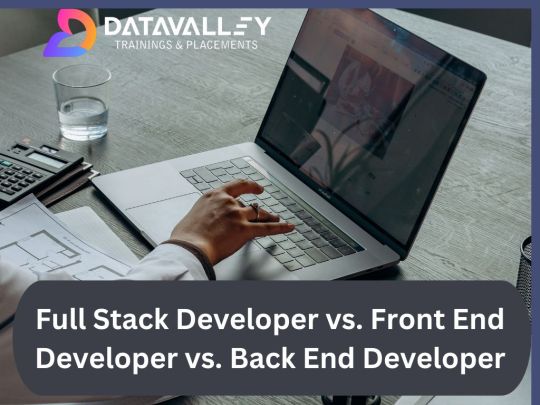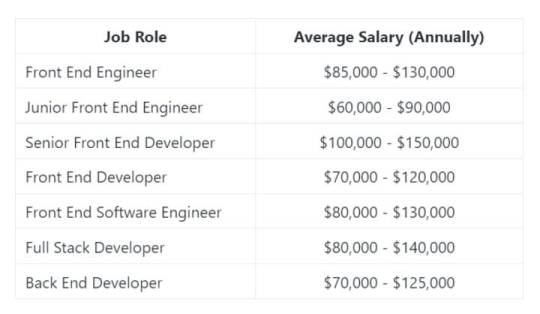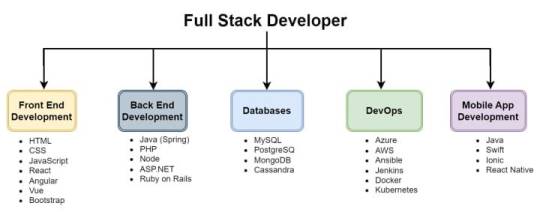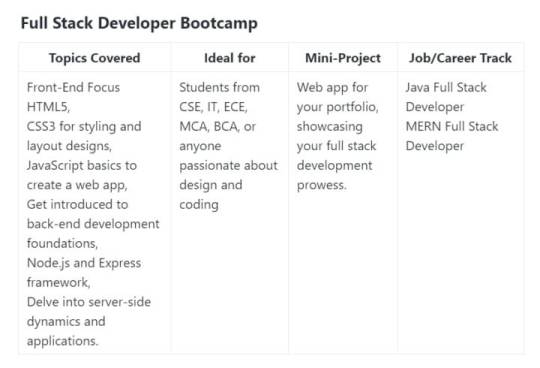#data engineering courses
Explore tagged Tumblr posts
Text
Enhance Your Career with Top-Notch Big Data Engineering Courses!
Dive into the world of data engineering with our comprehensive PG Program in Data Engineering and Data Analytics. In this 6-month course, you will master essential tools like AWS, Spark, Python, and more. Ideal for engineers, freshers, and IT professionals, this course offers hands-on training, industry projects, and one-on-one mentoring sessions. Unlock job opportunities as a Data Engineer, Big Data Consultant, or ETL Developer with our tailored curriculum. Join us at AVD Group and pave the way for a rewarding career in big data engineering. Apply now and take the first step towards success!
#Data Engineering Courses#Data Engineering Classes#Data Engineering Courses near me#Data Engineering Course
0 notes
Text
Building Real-Time Data Pipelines: Key Tools and Best Practices
As the demand for immediate insights grows across industries, real-time data pipelines are essential in modern data engineering. Unlike batch processing, which handles data at scheduled intervals, real-time pipelines process data continuously, enabling organizations to respond instantly to new information and events. Constructing these pipelines effectively requires the right tools, approaches, and industry best practices. Timely insights can be delivered by data engineers who can build robust, real-time data pipelines that deliver the insights effectively.
Choosing the Right Tools for Real-Time Data Processing
Building a real-time pipeline starts with selecting tools that can handle high-speed data ingestion and processing. Apache Kafka, a popular event streaming platform, manages vast amounts of data by distributing messages across multiple brokers, making it scalable. For stream processing, tools like Apache Flink and Spark Structured Streaming process data with low latency. Combining these tools allows data engineers to build flexible, adaptive pipelines that support complex processing requirements. Seamless integration between these tools reduces development time and ensures smooth data flow, allowing engineers to deliver value faster.
Defining Data Transformation and Processing Stages
After data ingestion, the next step is transforming it into a usable format. Real-time pipelines require transformations that clean, filter, and enrich data in motion. Tools like Apache Beam and AWS Lambda offer flexible options for real-time transformation. Apache Beam’s unified model works across systems like Flink and Spark, simplifying scalable transformations. Defining clear processing stages, such as aggregating for analytics or filtering for anomaly detection, ensures data is processed accurately for real-time delivery to users or applications. With these stages in place, engineers can optimize data flow at every step.
Ensuring Data Quality and Reliability
In real-time systems, data quality is critical, as errors can quickly compound. Data engineers should incorporate automated validation and error-handling mechanisms to maintain quality. Tools like Great Expectations enable customizable data validation, while Apache Druid offers real-time data monitoring. Error-handling strategies, such as retries and dead-letter queues, allow the pipeline to continue even if certain inputs fail. Managing data quality prevents errors from affecting downstream applications, ensuring insights remain accurate. These measures are crucial for maintaining trust in the pipeline’s outputs.
Monitoring and Optimizing Pipeline Performance
Monitoring ensures that real-time data pipelines run smoothly. Tools like Prometheus and Grafana track pipeline performance, measuring latency, throughput, and resource use. This helps engineers identify bottlenecks early on, such as ingestion slowdowns or increased processing loads. Optimizing performance may involve adjusting resources, fine-tuning partitioning, or scaling resources based on demand. Proactive monitoring and optimization keep data moving efficiently, reducing delays and improving responsiveness. Continuous performance checks enable data engineers to meet evolving business needs with ease.
Building Effective Real-Time Data Pipelines for Added Efficiency
Creating efficient real-time data pipelines requires a strategic approach to data ingestion, processing, and monitoring. By leveraging tools like Apache Kafka, Flink, and Great Expectations, data engineers can build high-quality pipelines for real-time insights. Web Age Solutions provides specialized real-time data engineering courses, helping professionals build responsive data pipelines and enabling organizations to remain agile and data-driven in today’s fast-paced landscape.
For more information visit: https://www.webagesolutions.com/courses/data-engineering-training
0 notes
Text
#B.Tech in Data Science#data analysis courses#data engineering courses#data engineering#machine learning course#bachelor degree#Plaksha#Plaksha University
0 notes
Text
youtube
How To Learn Math for Machine Learning FAST (Even With Zero Math Background)
I dropped out of high school and managed to became an Applied Scientist at Amazon by self-learning math (and other ML skills). In this video I'll show you exactly how I did it, sharing the resources and study techniques that worked for me, along with practical advice on what math you actually need (and don't need) to break into machine learning and data science.
#How To Learn Math for Machine Learning#machine learning#free education#education#youtube#technology#educate yourselves#educate yourself#tips and tricks#software engineering#data science#artificial intelligence#data analytics#data science course#math#mathematics#Youtube
21 notes
·
View notes
Text

Elevate Your Brand, Rule the Digital Space with Cybrom Technology.
#digital marketing#Social media marketing#Data science#data analytics#data analyst course#seo#search engine optimization#google ads
5 notes
·
View notes
Text
Your Guide to B.Tech in Computer Science & Engineering Colleges

In today's technology-driven world, pursuing a B.Tech in Computer Science and Engineering (CSE) has become a popular choice among students aspiring for a bright future. The demand for skilled professionals in areas like Artificial Intelligence, Machine Learning, Data Science, and Cloud Computing has made computer science engineering colleges crucial in shaping tomorrow's innovators. Saraswati College of Engineering (SCOE), a leader in engineering education, provides students with a perfect platform to build a successful career in this evolving field.
Whether you're passionate about coding, software development, or the latest advancements in AI, pursuing a B.Tech in Computer Science and Engineering at SCOE can open doors to endless opportunities.
Why Choose B.Tech in Computer Science and Engineering?
Choosing a B.Tech in Computer Science and Engineering isn't just about learning to code; it's about mastering problem-solving, logical thinking, and the ability to work with cutting-edge technologies. The course offers a robust foundation that combines theoretical knowledge with practical skills, enabling students to excel in the tech industry.
At SCOE, the computer science engineering courses are designed to meet industry standards and keep up with the rapidly evolving tech landscape. With its AICTE Approved, NAAC Accredited With Grade-"A+" credentials, the college provides quality education in a nurturing environment. SCOE's curriculum goes beyond textbooks, focusing on hands-on learning through projects, labs, workshops, and internships. This approach ensures that students graduate not only with a degree but with the skills needed to thrive in their careers.
The Role of Computer Science Engineering Colleges in Career Development
The role of computer science engineering colleges like SCOE is not limited to classroom teaching. These institutions play a crucial role in shaping students' futures by providing the necessary infrastructure, faculty expertise, and placement opportunities. SCOE, established in 2004, is recognized as one of the top engineering colleges in Navi Mumbai. It boasts a strong placement record, with companies like Goldman Sachs, Cisco, and Microsoft offering lucrative job opportunities to its graduates.
The computer science engineering courses at SCOE are structured to provide a blend of technical and soft skills. From the basics of computer programming to advanced topics like Artificial Intelligence and Data Science, students at SCOE are trained to be industry-ready. The faculty at SCOE comprises experienced professionals who not only impart theoretical knowledge but also mentor students for real-world challenges.
Highlights of the B.Tech in Computer Science and Engineering Program at SCOE
Comprehensive Curriculum: The B.Tech in Computer Science and Engineering program at SCOE covers all major areas, including programming languages, algorithms, data structures, computer networks, operating systems, AI, and Machine Learning. This ensures that students receive a well-rounded education, preparing them for various roles in the tech industry.
Industry-Relevant Learning: SCOE’s focus is on creating professionals who can immediately contribute to the tech industry. The college regularly collaborates with industry leaders to update its curriculum, ensuring students learn the latest technologies and trends in computer science engineering.
State-of-the-Art Infrastructure: SCOE is equipped with modern laboratories, computer centers, and research facilities, providing students with the tools they need to gain practical experience. The institution’s infrastructure fosters innovation, helping students work on cutting-edge projects and ideas during their B.Tech in Computer Science and Engineering.
Practical Exposure: One of the key benefits of studying at SCOE is the emphasis on practical learning. Students participate in hands-on projects, internships, and industry visits, giving them real-world exposure to how technology is applied in various sectors.
Placement Support: SCOE has a dedicated placement cell that works tirelessly to ensure students secure internships and job offers from top companies. The B.Tech in Computer Science and Engineering program boasts a strong placement record, with top tech companies visiting the campus every year. The highest on-campus placement offer for the academic year 2022-23 was an impressive 22 LPA from Goldman Sachs, reflecting the college’s commitment to student success.
Personal Growth: Beyond academics, SCOE encourages students to participate in extracurricular activities, coding competitions, and tech fests. These activities enhance their learning experience, promote teamwork, and help students build a well-rounded personality that is essential in today’s competitive job market.
What Makes SCOE Stand Out?
With so many computer science engineering colleges to choose from, why should you consider SCOE for your B.Tech in Computer Science and Engineering? Here are a few factors that make SCOE a top choice for students:
Experienced Faculty: SCOE prides itself on having a team of highly qualified and experienced faculty members. The faculty’s approach to teaching is both theoretical and practical, ensuring students are equipped to tackle real-world challenges.
Strong Industry Connections: The college maintains strong relationships with leading tech companies, ensuring that students have access to internship opportunities and campus recruitment drives. This gives SCOE graduates a competitive edge in the job market.
Holistic Development: SCOE believes in the holistic development of students. In addition to academic learning, the college offers opportunities for personal growth through various student clubs, sports activities, and cultural events.
Supportive Learning Environment: SCOE provides a nurturing environment where students can focus on their academic and personal growth. The campus is equipped with modern facilities, including spacious classrooms, labs, a library, and a recreation center.
Career Opportunities After B.Tech in Computer Science and Engineering from SCOE
Graduates with a B.Tech in Computer Science and Engineering from SCOE are well-prepared to take on various roles in the tech industry. Some of the most common career paths for CSE graduates include:
Software Engineer: Developing software applications, web development, and mobile app development are some of the key responsibilities of software engineers. This role requires strong programming skills and a deep understanding of software design.
Data Scientist: With the rise of big data, data scientists are in high demand. CSE graduates with knowledge of data science can work on data analysis, machine learning models, and predictive analytics.
AI Engineer: Artificial Intelligence is revolutionizing various industries, and AI engineers are at the forefront of this change. SCOE’s curriculum includes AI and Machine Learning, preparing students for roles in this cutting-edge field.
System Administrator: Maintaining and managing computer systems and networks is a crucial role in any organization. CSE graduates can work as system administrators, ensuring the smooth functioning of IT infrastructure.
Cybersecurity Specialist: With the growing threat of cyberattacks, cybersecurity specialists are essential in protecting an organization’s digital assets. CSE graduates can pursue careers in cybersecurity, safeguarding sensitive information from hackers.
Conclusion: Why B.Tech in Computer Science and Engineering at SCOE is the Right Choice
Choosing the right college is crucial for a successful career in B.Tech in Computer Science and Engineering. Saraswati College of Engineering (SCOE) stands out as one of the best computer science engineering colleges in Navi Mumbai. With its industry-aligned curriculum, state-of-the-art infrastructure, and excellent placement record, SCOE offers students the perfect environment to build a successful career in computer science.
Whether you're interested in AI, data science, software development, or any other field in computer science, SCOE provides the knowledge, skills, and opportunities you need to succeed. With a strong focus on hands-on learning and personal growth, SCOE ensures that students graduate not only as engineers but as professionals ready to take on the challenges of the tech world.
If you're ready to embark on an exciting journey in the world of technology, consider pursuing your B.Tech in Computer Science and Engineering at SCOE—a college where your future takes shape.
#In today's technology-driven world#pursuing a B.Tech in Computer Science and Engineering (CSE) has become a popular choice among students aspiring for a bright future. The de#Machine Learning#Data Science#and Cloud Computing has made computer science engineering colleges crucial in shaping tomorrow's innovators. Saraswati College of Engineeri#a leader in engineering education#provides students with a perfect platform to build a successful career in this evolving field.#Whether you're passionate about coding#software development#or the latest advancements in AI#pursuing a B.Tech in Computer Science and Engineering at SCOE can open doors to endless opportunities.#Why Choose B.Tech in Computer Science and Engineering?#Choosing a B.Tech in Computer Science and Engineering isn't just about learning to code; it's about mastering problem-solving#logical thinking#and the ability to work with cutting-edge technologies. The course offers a robust foundation that combines theoretical knowledge with prac#enabling students to excel in the tech industry.#At SCOE#the computer science engineering courses are designed to meet industry standards and keep up with the rapidly evolving tech landscape. With#NAAC Accredited With Grade-“A+” credentials#the college provides quality education in a nurturing environment. SCOE's curriculum goes beyond textbooks#focusing on hands-on learning through projects#labs#workshops#and internships. This approach ensures that students graduate not only with a degree but with the skills needed to thrive in their careers.#The Role of Computer Science Engineering Colleges in Career Development#The role of computer science engineering colleges like SCOE is not limited to classroom teaching. These institutions play a crucial role in#faculty expertise#and placement opportunities. SCOE#established in 2004#is recognized as one of the top engineering colleges in Navi Mumbai. It boasts a strong placement record
2 notes
·
View notes
Text
At Fusion Software Institute, we offer dynamic courses blending theory and hands-on training to prepare you for a successful career in IT.
#software engineering#Education#data science#Data anlytics#Course#it industry#classes#fusion institute#hybrid classes
1 note
·
View note
Text
Who provides the best Informatica MDM training?
1. Introduction to Informatica MDM Training
Informatica MDM (Master Data Management) is a crucial aspect of data management for organizations dealing with large volumes of data. With the increasing demand for professionals skilled in Informatica MDM, the need for quality training has become paramount. Choosing the right training provider can significantly impact your learning experience and career prospects in this field.

2. Importance of Choosing the Right Training Provider
Selecting the best Informatica MDM training provider is essential for acquiring comprehensive knowledge, practical skills, and industry recognition. A reputable training provider ensures that you receive the necessary guidance and support to excel in your career.
3. Factors to Consider When Choosing Informatica MDM Training
Reputation and Experience
A reputable training provider should have a proven track record of delivering high-quality training and producing successful professionals in the field of Informatica MDM.
Course Curriculum
The course curriculum should cover all essential aspects of Informatica MDM, including data modeling, data integration, data governance, and data quality management.
Training Methodology
The training methodology should be interactive, engaging, and hands-on, allowing participants to gain practical experience through real-world scenarios and case studies.
Instructor Expertise
Experienced and certified instructors with extensive knowledge of Informatica MDM ensure effective learning and provide valuable insights into industry best practices.
Flexibility of Learning Options
Choose a training provider that offers flexible learning options such as online courses, instructor-led classes, self-paced learning modules, and blended learning approaches to accommodate your schedule and learning preferences.
4. Comparison of Training Providers
When comparing Informatica MDM training providers, consider factors such as cost, course duration, support services, and reviews from past participants. Choose a provider that offers the best value for your investment and aligns with your learning objectives and career goals.
5. Conclusion
Selecting the right Informatica MDM training provider is crucial for acquiring the necessary skills and knowledge to succeed in this competitive field. Evaluate different providers based on factors such as reputation, course curriculum, instructor expertise, and flexibility of learning options to make an informed decision.
Contact us 👇
📞Call Now: +91-9821931210 📧E Mail: [email protected] 🌐Visit Website: https://inventmodel.com/course/informatica-mdm-online-live-training
#informatica#software engineering#MDM Training#Informatica MDM Training#Data Management courses#MDM online course#online informatica training
3 notes
·
View notes
Text
Full Stack Developer vs. Front End Developer vs. Back End Developer

The role of a web developer is always included in the lists of high-paying IT jobs. This is because web developers are essential in today’s digital world. They create amazing websites, high-performing e-commerce sites, and other web-based applications. If you want to be a web developer, you must understand that full-stack developer skills are in great demand. However, do you understand the differences between full-stack, front-end, and back-end web development? In this post, we’ll see the differences between these three job roles, skills, and salaries.
What is Web Development?
The process of developing a website on the internet is known as web development. The non-design components of a website, such as building features and functioning with programming, markup, and scripting languages, are referred to as web development. Developers focus on technical aspects of website development such as architecture, programming, and application integration, as well as visuals.
A web developer is someone who does the following:
Creates and maintains webpages and other web-based applications.
Creates a website from a web design.
They collaborate with clients, stakeholders, and designers to understand the concept.
Can focus on frontend or backend development. Even as a full-stack developer, if necessary.
Types of Web Development
Front End Development: This aspect of web development focuses on what the user interacts with directly, i.e., the user interface of a website or web application. Front-end development deals with the design, layout, and interactivity of a site, ensuring that it’s visually appealing and user-friendly.
Back End Development: The back end is the part of a website or application that operates behind the scenes. It manages data, user authentication, and the server-side logic, ensuring the smooth functioning of the website.
Now, let’s delve into each of these roles in detail.
What is front-end development?
Front-end development, often referred to as client-side development, is the process of creating the visual elements of a website or web application that users interact with directly. It involves writing code for the user interface, optimizing website performance, and ensuring the site looks and functions correctly on various devices and browsers.
Who is a front-end developer?
A front-end developer, also known as a client-side developer, is responsible for turning web designs into a functioning website or application. They work closely with web designers and back-end developers to create an engaging and responsive user experience.
What are the front-end developer’s skills?
Front-end developers should be proficient in the following skills:
Mastery of HTML (Hypertext Markup Language) and CSS (Cascading Style Sheets) is fundamental for structuring and styling web pages.
Proficiency in JavaScript is crucial for adding interactivity and dynamic features to a website.
Knowledge of front-end frameworks like React, Angular, or Vue.js, which simplify and expedite development.
The ability to create websites that look and function well on various devices and screen sizes.
Ensuring that the website performs consistently across different browsers.
Familiarity with version control systems like Git for code management and collaboration.
Front End Developer Salary
The salary of a front-end developer can vary based on factors such as experience, location, and the company. On average, junior front-end developers can earn between $50,000 and $70,000 annually, while senior front-end developers can command salaries ranging from $90,000 to $120,000 or more.
What is Back End Development?
Back-end development, often referred to as server-side development, focuses on the server and database sides of a website or web application. It involves building and maintaining the server, databases, and applications that enable the front end to function correctly.
Who is a Back End Developer?
A back-end developer is responsible for managing the server, databases, and server-side logic of a website or application. They ensure that data is stored securely, accessed efficiently, and transmitted effectively between the front end and back end.
What are Back End Developer Skills?
Back-end developers should have expertise in the following areas:
Server-Side Programming Languages: Proficiency in languages such as Python, Ruby, Node.js, PHP, or Java is used to build server-side applications.
Databases: Knowledge of database management systems like MySQL, PostgreSQL, MongoDB, and NoSQL databases.
APIs: The ability to create and manage APIs (Application Programming Interfaces) for communication between the front end and back end.
Server Management: Skills in managing web servers and server infrastructure.
Security: Understanding web security practices and techniques to protect user data.
Version Control/Git: Proficiency in version control systems to manage and collaborate on code.
Back End Developer Salary
Back-end developer salaries can also vary based on experience, location, and the organization. Junior back-end developers can earn an annual salary ranging from $60,000 to $90,000, while senior back-end developers can expect salaries ranging from $100,000 to $150,000 or more.
Frontend vs. Backend Development
Front-end and back-end development are two halves of a whole, and they must work together seamlessly to create a functional website or application. While front-end developers focus on user interface and design, back-end developers deal with the underlying server infrastructure and data management. Both roles are essential for a successful web project.

What is a Full Stack Developer?

Who is a Full Stack Developer?
A full stack developer is a well-rounded professional who can take care of every aspect of web development, from designing the user interface to managing databases and server-side logic. They bridge the gap between front end and back-end development, ensuring that the entire application functions cohesively.
What are the Full Stack Developer Skills?
Full stack developers need a broad range of skills, including:
HTML/CSS: Proficiency in front end technologies for web page structuring and styling.
JavaScript: Mastery of JavaScript for creating dynamic and interactive web elements.
Front End Frameworks: Knowledge of front-end frameworks for efficient development.
Server-Side Programming Languages: Expertise in languages like Node.js, Python, Ruby, or Java for server-side development.
Databases: Proficiency in database management systems for data storage and retrieval.
APIs: Ability to create and manage APIs for communication between the front end and back end.
Version Control/Git: Familiarity with version control systems for code management.
Problem-Solving: Strong analytical and problem-solving skills to troubleshoot and optimize web applications.
Full Stack Developer Salary
Full-stack web developers are in high demand due to their range of skills and extensive knowledge. An average full stack developer’s annual salary might range from $110,000 to $150,000, based on their skill set and expertise.
Full-stack engineers earn more money than front end or back end developers. Employers agree to pay more for a full stack developer since it makes more business sense to hire one person with front and back end expertise rather than two.
As a result, the profession of a full stack developer is a profitable alternative for aspirants looking to create a career in the digital business.
The choice between becoming a full stack developer, front end developer, or back end developer depends on your interests, strengths, and career goals. Front end developers excel at creating visually appealing and user-friendly interfaces; back end developers focus on the server-side and data management; and full stack developers possess a comprehensive skill set that allows them to manage the entire development process. Each role is integral to the web development ecosystem, and the right one for you depends on your passions and aspirations within the field.
If you’re considering the path of a full stack developer and are eager to acquire the comprehensive skill set required to excel in this role, we have an excellent suggestion for you. Consider enrolling in the Full Stack Developer course at Datavalley.
Datavalley has a stellar track record of empowering aspiring developers with the knowledge and expertise to succeed in the dynamic world of web development. Their course covers everything from the fundamentals of HTML and CSS to in-depth training in JavaScript, front end and back end frameworks, and much more.
By joining Datavalley’s Full Stack Developer course, you’ll gain hands-on experience, build an impressive portfolio, and be well-prepared for a rewarding career in web development.
Don’t miss out on this opportunity to kickstart your journey as a Full Stack Developer with Datavalley. Your future in web development awaits. Take the first step today!
Attend Free Bootcamp at Datavalley
If you’re looking to supercharge your Java development skills and become a full-stack Java developer, consider joining the Java Full Stack Developer bootcamp at Datavalley. It’s an excellent opportunity to enhance your expertise and take your career to the next level.
Key points about Bootcamps:
It is completely free, and there is no obligation to complete the entire course.
20 hours total, two hours daily for two weeks.
Gain hands-on experience with tools and projects.
Explore and decide if the field or career is right for you.
Complete a mini project.
Earn a certificate to show on your profile.
No commitment is required after bootcamp.
Take another bootcamp if you are unsure about your track.

#datavalley#dataexperts#data engineering#data analytics#dataexcellence#business intelligence#data science#power bi#data analytics course#data science course#full stack course#full stack training#full stack web development#full stack developer#full stack software developer#front end developers#back end development
7 notes
·
View notes
Text
Elaine Liu: Charging ahead
New Post has been published on https://thedigitalinsider.com/elaine-liu-charging-ahead/
Elaine Liu: Charging ahead


MIT senior Elaine Siyu Liu doesn’t own an electric car, or any car. But she sees the impact of electric vehicles (EVs) and renewables on the grid as two pieces of an energy puzzle she wants to solve.
The U.S. Department of Energy reports that the number of public and private EV charging ports nearly doubled in the past three years, and many more are in the works. Users expect to plug in at their convenience, charge up, and drive away. But what if the grid can’t handle it?
Electricity demand, long stagnant in the United States, has spiked due to EVs, data centers that drive artificial intelligence, and industry. Grid planners forecast an increase of 2.6 percent to 4.7 percent in electricity demand over the next five years, according to data reported to federal regulators. Everyone from EV charging-station operators to utility-system operators needs help navigating a system in flux.
That’s where Liu’s work comes in.
Liu, who is studying mathematics and electrical engineering and computer science (EECS), is interested in distribution — how to get electricity from a centralized location to consumers. “I see power systems as a good venue for theoretical research as an application tool,” she says. “I’m interested in it because I’m familiar with the optimization and probability techniques used to map this level of problem.”
Liu grew up in Beijing, then after middle school moved with her parents to Canada and enrolled in a prep school in Oakville, Ontario, 30 miles outside Toronto.
Liu stumbled upon an opportunity to take part in a regional math competition and eventually started a math club, but at the time, the school’s culture surrounding math surprised her. Being exposed to what seemed to be some students’ aversion to math, she says, “I don’t think my feelings about math changed. I think my feelings about how people feel about math changed.”
Liu brought her passion for math to MIT. The summer after her sophomore year, she took on the first of the two Undergraduate Research Opportunity Program projects she completed with electric power system expert Marija Ilić, a joint adjunct professor in EECS and a senior research scientist at the MIT Laboratory for Information and Decision Systems.
Predicting the grid
Since 2022, with the help of funding from the MIT Energy Initiative (MITEI), Liu has been working with Ilić on identifying ways in which the grid is challenged.
One factor is the addition of renewables to the energy pipeline. A gap in wind or sun might cause a lag in power generation. If this lag occurs during peak demand, it could mean trouble for a grid already taxed by extreme weather and other unforeseen events.
If you think of the grid as a network of dozens of interconnected parts, once an element in the network fails — say, a tree downs a transmission line — the electricity that used to go through that line needs to be rerouted. This may overload other lines, creating what’s known as a cascade failure.
“This all happens really quickly and has very large downstream effects,” Liu says. “Millions of people will have instant blackouts.”
Even if the system can handle a single downed line, Liu notes that “the nuance is that there are now a lot of renewables, and renewables are less predictable. You can’t predict a gap in wind or sun. When such things happen, there’s suddenly not enough generation and too much demand. So the same kind of failure would happen, but on a larger and more uncontrollable scale.”
Renewables’ varying output has the added complication of causing voltage fluctuations. “We plug in our devices expecting a voltage of 110, but because of oscillations, you will never get exactly 110,” Liu says. “So even when you can deliver enough electricity, if you can’t deliver it at the specific voltage level that is required, that’s a problem.”
Liu and Ilić are building a model to predict how and when the grid might fail. Lacking access to privatized data, Liu runs her models with European industry data and test cases made available to universities. “I have a fake power grid that I run my experiments on,” she says. “You can take the same tool and run it on the real power grid.”
Liu’s model predicts cascade failures as they evolve. Supply from a wind generator, for example, might drop precipitously over the course of an hour. The model analyzes which substations and which households will be affected. “After we know we need to do something, this prediction tool can enable system operators to strategically intervene ahead of time,” Liu says.
Dictating price and power
Last year, Liu turned her attention to EVs, which provide a different kind of challenge than renewables.
In 2022, S&P Global reported that lawmakers argued that the U.S. Federal Energy Regulatory Commission’s (FERC) wholesale power rate structure was unfair for EV charging station operators.
In addition to operators paying by the kilowatt-hour, some also pay more for electricity during peak demand hours. Only a few EVs charging up during those hours could result in higher costs for the operator even if their overall energy use is low.
Anticipating how much power EVs will need is more complex than predicting energy needed for, say, heating and cooling. Unlike buildings, EVs move around, making it difficult to predict energy consumption at any given time. “If users don’t like the price at one charging station or how long the line is, they’ll go somewhere else,” Liu says. “Where to allocate EV chargers is a problem that a lot of people are dealing with right now.”
One approach would be for FERC to dictate to EV users when and where to charge and what price they’ll pay. To Liu, this isn’t an attractive option. “No one likes to be told what to do,” she says.
Liu is looking at optimizing a market-based solution that would be acceptable to top-level energy producers — wind and solar farms and nuclear plants — all the way down to the municipal aggregators that secure electricity at competitive rates and oversee distribution to the consumer.
Analyzing the location, movement, and behavior patterns of all the EVs driven daily in Boston and other major energy hubs, she notes, could help demand aggregators determine where to place EV chargers and how much to charge consumers, akin to Walmart deciding how much to mark up wholesale eggs in different markets.
Last year, Liu presented the work at MITEI’s annual research conference. This spring, Liu and Ilić are submitting a paper on the market optimization analysis to a journal of the Institute of Electrical and Electronics Engineers.
Liu has come to terms with her early introduction to attitudes toward STEM that struck her as markedly different from those in China. She says, “I think the (prep) school had a very strong ‘math is for nerds’ vibe, especially for girls. There was a ‘why are you giving yourself more work?’ kind of mentality. But over time, I just learned to disregard that.”
After graduation, Liu, the only undergraduate researcher in Ilić’s MIT Electric Energy Systems Group, plans to apply to fellowships and graduate programs in EECS, applied math, and operations research.
Based on her analysis, Liu says that the market could effectively determine the price and availability of charging stations. Offering incentives for EV owners to charge during the day instead of at night when demand is high could help avoid grid overload and prevent extra costs to operators. “People would still retain the ability to go to a different charging station if they chose to,” she says. “I’m arguing that this works.”
#2022#amp#Analysis#approach#artificial#Artificial Intelligence#attention#Behavior#Building#buildings#Canada#cascade#challenge#China#competition#computer#Computer Science#conference#consumers#cooling#course#data#Data Centers#devices#effects#electric power#electric vehicles#Electrical engineering and computer science (EECS)#electricity#Electronics
2 notes
·
View notes
Text
Navigating the Data Landscape: A Deep Dive into ScholarNest's Corporate Training

In the ever-evolving realm of data, mastering the intricacies of data engineering and PySpark is paramount for professionals seeking a competitive edge. ScholarNest's Corporate Training offers an immersive experience, providing a deep dive into the dynamic world of data engineering and PySpark.
Unlocking Data Engineering Excellence
Embark on a journey to become a proficient data engineer with ScholarNest's specialized courses. Our Data Engineering Certification program is meticulously crafted to equip you with the skills needed to design, build, and maintain scalable data systems. From understanding data architecture to implementing robust solutions, our curriculum covers the entire spectrum of data engineering.
Pioneering PySpark Proficiency
Navigate the complexities of data processing with PySpark, a powerful Apache Spark library. ScholarNest's PySpark course, hailed as one of the best online, caters to both beginners and advanced learners. Explore the full potential of PySpark through hands-on projects, gaining practical insights that can be applied directly in real-world scenarios.
Azure Databricks Mastery
As part of our commitment to offering the best, our courses delve into Azure Databricks learning. Azure Databricks, seamlessly integrated with Azure services, is a pivotal tool in the modern data landscape. ScholarNest ensures that you not only understand its functionalities but also leverage it effectively to solve complex data challenges.
Tailored for Corporate Success
ScholarNest's Corporate Training goes beyond generic courses. We tailor our programs to meet the specific needs of corporate environments, ensuring that the skills acquired align with industry demands. Whether you are aiming for data engineering excellence or mastering PySpark, our courses provide a roadmap for success.
Why Choose ScholarNest?
Best PySpark Course Online: Our PySpark courses are recognized for their quality and depth.
Expert Instructors: Learn from industry professionals with hands-on experience.
Comprehensive Curriculum: Covering everything from fundamentals to advanced techniques.
Real-world Application: Practical projects and case studies for hands-on experience.
Flexibility: Choose courses that suit your level, from beginner to advanced.
Navigate the data landscape with confidence through ScholarNest's Corporate Training. Enrol now to embark on a learning journey that not only enhances your skills but also propels your career forward in the rapidly evolving field of data engineering and PySpark.
#data engineering#pyspark#databricks#azure data engineer training#apache spark#databricks cloud#big data#dataanalytics#data engineer#pyspark course#databricks course training#pyspark training
3 notes
·
View notes
Text
The Impact of 5G on Data Engineering: Preparing for Increased Data Volumes and Speed
The rollout of 5G technology is transforming the digital landscape, promising faster data speeds, lower latency, and broader connectivity. For data engineers, 5G’s impact is especially significant as it leads to a surge in data volume and a need for faster data processing. This new era requires data engineering teams to re-evaluate their workflows, tools, and architectures to accommodate the massive amounts of data 5G will generate.
Adapting Data Pipelines for Real-Time Processing
5G’s support for real-time data transmission unlocks new opportunities for immediate analytics. With increased streaming data from IoT devices, applications, and video feeds, data engineers must build real-time data pipelines capable of instant processing. Traditional batch models are insufficient; instead, tools like Apache Kafka, Apache Flink, and Apache Spark Streaming should be utilized. These frameworks facilitate continuous data flow, allowing businesses to gain insights instantly and respond to information as it arrives, ultimately enhancing decision-making speed and accuracy.
Enhancing Infrastructure Scalability
The surge in connected devices with 5G demands infrastructure scalability to manage high data volumes and sudden traffic spikes. Data engineers will need to adopt scalable cloud services like AWS, Google Cloud, and Azure for real-time resource adjustment. Containerization and orchestration tools like Docker and Kubernetes are also crucial, as they enable efficient deployment, management, and scaling of applications across distributed systems. This combination of cloud elasticity and container management ensures reliable access and responsiveness, supporting the demands of 5G-driven data.
Emphasizing Edge Computing for Decentralized Data Processing
5G’s expansion enables more data processing at the edge, closer to the data source, reducing reliance on centralized data centers. Data engineers must design systems that use edge computing for faster, more efficient processing, reducing latency and network load. This is crucial for real-time applications like autonomous vehicles and industrial IoT. Engineers should explore edge-friendly architectures and distributed computing frameworks to support the demands of decentralized data processing.
Reinforcing Data Security and Privacy
5G’s increased data volume and connectivity intensify the need for robust data security. Data engineers must adopt encryption at rest and in transit to protect data and ensure compliance with GDPR and CCPA. Implementing access control, network segmentation, and automated monitoring is essential for proactive security. These measures safeguard sensitive information, supporting secure data flow in a 5G-connected environment.
Optimizing Data Storage and Management
With 5G accelerating data generation, efficient storage is crucial. Data engineers need strategies to manage this influx while controlling costs. A tiered storage architecture—storing frequently accessed data on high-performance systems and moving infrequent data to cost-effective solutions—optimizes storage. Additionally, data lake architectures provide flexible, scalable storage for both structured and unstructured data, accommodating diverse datasets from various 5G-connected devices.
Developing Data Engineering for a 5G-Driven Future
5G is driving a new era of data engineering, pushing engineers to rethink data pipelines, scalability, security, and storage. Adapting to this shift is essential for organizations aiming to harness the potential of 5G-driven insights. With advanced data engineering courses by Web Age Solutions, professionals can be empowered to build resilient and scalable systems that can handle the demands of 5G.
For more information visit: https://www.webagesolutions.com/courses/data-engineering-training
0 notes
Text
i don't really get the assumption that everyone who uses chatgpt is telling it to generate prose or w/e. if i want good fiction or poetry i know where to go for that and it isn't to a bot.
i use it when i need to complain about my emotional problems which are too embarrassing to tell a real person, and also ask it questions too specific for google, like about particular chemical elements or certain planetary placements in astrology or "recommend me music with sounds like [timestamp] in [song title]" lol
#random rambles#honestly i think it has potential to be a good learning tool because it allows for a higher level of detail than a search engine#maybe this is a hot take but i think its general premise is good actually#of course its no–holds–barred method of harvesting data is Not good#but i think with enough demand they will be forced to change how it works once first–world govts start pressuring them about it#idk i think we're in the same phase that dawns on humans every time a new bit of modern tech is made available to the average person#there's a lot of panic about what it 'could' do and what it means for Us and some of the fear is absolutely warranted#because heaven knows the first several versions of any major invention are flawed in multiple ways#but with time it gets more refined and less 'threatening' and we become familiar with it and eventually it becomes just another Thing lol
3 notes
·
View notes
Text
a few years back my car insurance company offered me a discount if i stuck a dongle in my car that would tell them how i drive (specifically reporting hard accelerations and stops), with a base discount of 10% even if i drive like a madman up to 40%ish if i drive like a grandma. and of course naturally my first thought was "huh i bet i could make something running off an Arduino that filters hard brakes and accelerations out of the incoming data stream to get that 40% discount" and i got as far as looking up OBD2 protocols before realizing that that would just be insurance fraud. yes im an engineer raised by two engineers how could you tell
39K notes
·
View notes
Text
#Apache Spark Databricks tutorial#Best data engineering tools 2025#Data engineering with Databricks#Databricks certification course#Databricks training#learn databricks in 2025#Learn Databricks online
0 notes
Text
Data Engineering Course in Pune
Learn the fundamentals of big data management, architecture, and processing from industry experts. Enrol for Data Engineering course in Pune
0 notes